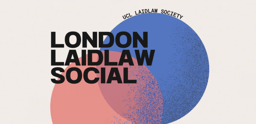What is a Leader?: Reflecting on the Laidlaw Journey

I still remember receiving my acceptance letter 18 months ago:
'Congratulations, I’m delighted to inform you that you have been selected to join the 2022 cohort of Laidlaw Scholars at Trinity.' wrote Joel, the Laidlaw coordinator.
Thinking back to that time and reflecting on where I am today; I can say that I've become a more confient and fast person; and it's safe to say that the Laidlaw scholarship has helped me become who I am today.
The Laidlaw scholarship is so much more than a conventional scholarship. It's a journey. From the independent research, to the LiA, to meeting others scholars from around the world; it's been a ride with experiences that will stay with me for the future.
I've faced many challenges throughout my journey; but these were challenges that helped define my time in the programme. The summer research program was the first insight into dealing with difficult situations, having to self-define and work independently on a difficult research topic in efforts to make a meaningful contribution in a 6 week timeframe. The LiA taught me how to be a self-starter in a completely new and unfamiliar environment, and how to be self-sufficient; seeking new ways to become involved in the LiA.
Importantly, in experiencing these and along my journey, it has taught me to define and how to become a leader. Walking into the first LEAD session, all I know about leadership was that it was synonymous with 'boss'. I've since learned that a leader is much more than that; it's someone that inspires and motivates a team to complete a shared interest. My definition has changed to define a leader as a person that works with a team rather than someone that examines a team.
Throughout the Laidlaw journey, there has been significant emphasis placed on globalisation; evidenced by all the traveling capabilities that a Laidlaw scholar has. The definition of a leader also encompasses this facet. A leader is someone that knows, or is at least aware, of how to deal with people from different backgrounds. A leader is aware that people have different thought processes and ideologies which can be influenced by location. A good leader is one that chooses to, and can lead, a diverse team. This became apparent to me on my LiA where I was required to work alongside the team. The team itself had people from all around the world and of different background; and the team worked well based on the contributions of these different people. The team leader knew how to use individual strengths to favourably influence the project.
Personally, I know am more confident of my own leading style. Although I am by no means certain still of how to correctly lead a high functioning team, I at least have some principles that I've developed throughout my team in the Laidlaw programme, and has been only strengthened by the LiA. An effective leader is one that, I believe, encourages input, listens attentively, is empathetic yet stern and above all can recognise talents and brilliance; and tries to faciliate growth. I've come to find that a leader is actually a much more complex task. The LiA taught me to deal with difficult situations and taught me how to deal with failure; a concept I previously believed impossible. However, I've ever since then learned that even the most competent leaders fail; effective leaders are ones that can recover and deal with it.
An important aspect of the Laidlaw journey was constantly being surrounded by like minded people; people who were eager to learn to become future leaders. Being bunched with other Laidlaw scholars in LEAD sessions allowed for constructive and open dialogues which further added to the LEAD sessions dedicated to teaching the scholars how to become a leader. The LEAD sessions were an incredibly useful resource; and as the LEAD sessions progressed, specifcially the residential LEAD session, the scholars became more comfortable and more open with each other; and I'm confident we've all learned from each other as all of the scholars' backgrounds are completely different to one another.
An aspect of leadership that was always emphasised in dialogues with the other scholars was ethical leadership and how to lead in a changing landscape. Similarly, ethical leadership was a topic that was exercised during both my LiA and summer research project. Ethical dilemmas are often faced in leadership, and while working in a team on my LiA, the team had to make decisions that were not always straightforward. I have learned that it is important to have a diverse team that can facilitate constructive feedback in efforts to make an informed decision. I believe as a leader it is impossible to be an ethical leader without also being a democratic one; taking a sole decision as a leader is inherently not ethical.
The Laidlaw journey highlighted the importance of leadership, and was a journey which started with me having a vastly different view and attitude towards leadership today. Throughout the journey I've made some unforgettable experiences and have met some interesting and passionate people that have helped shape my experience and have helped in making the Laidlaw experience an unforgettable one.
On reflection, I can say with certainty that I've made an impact on the local community throughout my time participating in the LiA. Although there were many things for me to do, there are three distinct ways that allowed me to make this impact.
Science Outreach to Disadvantaged Areas
An area that I feel very strongly about is providing education to people, specifically children in disadvantaged areas. My LiA in Cambridge allowed me to do this - reaching out to areas in Cambridgeshire that are socioeconomically challenged. I was able to go to schools to teach kids about physics with the hopes of inspiring them to pursue further education specifically in STEM-related areas. I did this by making my demonstrations more hands-on and also allowing the children to participate freely.
Community Engagement
Throughout my LiA, I was constantly involved with the community. This ranged from reaching out to local schools as mentioned above, advertising in the local community by means of sticking up posters and participating in local events to spread the word of the events and finally social media engagement. Community engagement was particularly important towards the end of the LiA in order to gauge interest from participants and to examine areas that need to be improved for the next iteration of events. It was quite interesting to deal with such a diverse community. The festival saw the highest amount of engagement ever - with over 10,000 attendees online and in person, with most reporting great satisfaction levels.
Event Management & Local Business Liaison
Throughout my LiA, I had the opportunity to see events through all of their various stages of planning - from their inception to the final feedback form that participants filled out at the end. I was required to manage a variety of events, however, the one that required me to act on my own accord most of the time were the interactive workshops held in the local shopping centre targeted at families. These events were a success, mainly in part due to the extensive planning done beforehand. I was required to liaise with the shopping centre management to secure a space, parking, furniture, advertisement & personnel - I have never managed anything to this scale before. Although overwhelming, I managed to ensure that an impact was made at the end - specifically on the children that attended; as the main goal was to inspire children to consider studying STEM-related fields in the future.
Although I faced some difficulties such as protests (due to the Engineering School's sponsors being an oil company), lack of some materials, etc etc; I was overall happy with how my two planned workshops ran:
-
- Reuse Materials to Save the Planet
- The CSVPA Sustainable Fashion Emporium
The Cambridge Festival aims to explore topical issues in a different light; the workshops here obviously dealt with climate change and sustainability - but in a way that leaves an impact on children and their families while also influencing their study preferences in the future. The workshops saw children building bridges from recyled material or sewing and making clothes from recycled scraps.
Holding the workshops in the shopping centre increase the footfall that day which helped out local businesses. Furthermore, children and their families became interested in the organisations that hosted these workshops which allowed them to engage.
It was a thrill to be able to run events and see how much enjoyment the different activities provided to children, families, students and adults. I believe I left an impact on the Cambridge Festival team and they will (hopefully) incorporate the work I did with them in the next iteration of the Festival.



Please sign in
If you are a registered user on Laidlaw Scholars Network, please sign in
What an inspiring relfection Mihai!